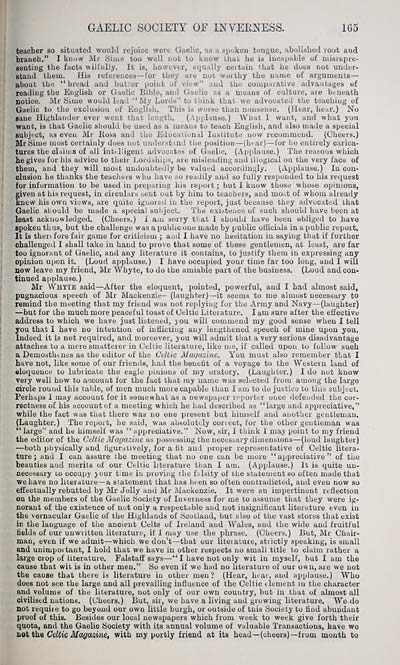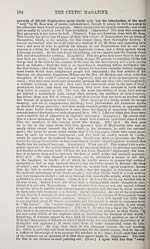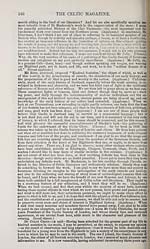Blair Collection > Celtic magazine > Volume 5
(175)
Download files
Complete book:
Individual page:
Thumbnail gallery: Grid view | List view

GAELIC SOCIETY OE INVERNESS. 165
teacher so situated would rejoice were Gaelic, as a spoken tougue, abolished rout and
branch." I know Mr Siuie too well not to know that he is incHpable of misrepre-
senting the facts wilfully. It is, however, equally certain that he does not under-
Btaud them. His references — for they are noi worthy the name of arguments —
about the "bread and butier point of view" and the compaiative advantages of
reading the English or Gaelic Bible, and Gaelic as a means of culture, ate beneath
notice. Mr Sime would lead "My Lord.s" to think that we advocated the teaching of
Gaelic to the exclusion of English. This is worse than nou.sense. (Hear, hear.) No
sane Highlandei' ever went that length. (Applause.) What I want, and what you
want, is that Gaelic should be used as a means to teacn English, and also made a special
subject, as even Mr Ross and the Educational Institute now recommend. (Cheers.)
MriSime most certainly does not understand the position — (hear) — for he entirely carica-
tures the clduis of all intelligent advocates of Gaelic. (Applause.) The reasous which
he gives for his advice to their Lordships, are misleading and illogical on the very face of
them, and they will most undoubtedly be valued accordingly. (Applause.) In con-
clusion he thanks the teachers who have so readily and so fully responded to his request
for information to be used in preparing his report ; but I know thoso whose opinions,
given at his request, in circulars sent out by him to teachers, and most of whom already
knew his own views, are quite ignored in the report, just because they advocated that
Gaelic should be made a special suliject. The existence of such shoulel have been at
least acknowledged. (Cheers.) I am sorry that I should have been obliged to have
spoken thus, but the challenge was a public one made by public officials in a public repoit.
It is theri fore fair game for criticism ; aud I have no hesitation in saying that if further
challenged I shall take in hand to prove that some of these gentlemen, at least, are far
too ignorant of Gaelic, and any literature it contains, to justify them in expressing any
opinion upon it. (Loud applause.) I have occupied your time far too long, and I will
now leave my friend, Mr Why te, to do the amiable part of the business. (Loud and con-
tinued applause.)
Mr Whyib said — After the eloquent, pointed, powerful, and I had almost said,
pugnacious speech of Mr Mackenzie- (laughter) — it seems to me almost necessary to
remind the meeting that my friend was not re[dyiug for the Army and Navy— (laughter)
—but for the much more peaceful toast of Celtic Literature. I am sure after the effective
address to which we have just listened, you will commend my good sense when I tell
you that I have no intention of inflicting any lengthened speech of mine upon you.
Indeed it is not required, and moreover, you will admit that a very serious disadvantage
attaches to a mere smatterer in Celtic literature, like uie, if called upon to follow such
a Demosthenes as the editor of the Celtic Maqazine. You must also remember that I
have not, like some of our friends, had the benefit of a voyage to the Western land of
eloquence to lubricate the eagle pinions of my oratory. (Laughter.) I do not know
very well how to account for the fact that my name was selected from among the large
circle round this table, of men much more capable than I am to do justice to this subject.
Perhaps 1 may account for it somewhat as a newspaper reporter once defended the cor-
rectness of his account of a meeting which he had described as "large and appreciative,"
while the fact was that there was no one present but himself and another gentleman.
(Laughter.) The report, he said, was absolutely coriect, for the other gentleman was
" large" and hu himself was " appreciative." Now, sir, I think I may point to my friend
the editor of the Celtic Magazine as possessing the necessary dimensions — (loud laughter)
— both physically and figuratively, for a tit auel proper representative of Celtic litera-
ture ; and I can assure the meeting that no one can be more "appreciative" of the
beauties aud merits of our Celtic literature than I am. (Applause.) It is quite un-
necessary to occupy jour time in proving the fwlsity of the statement so often made that
we have no literature— a statement that has been so often contradicted, and even now so
effectually rebutted by Mr Jolly and Mr Mackenzie. It were an impertinent reflection
on the members of the Gaelic Society of Inverness for me to assume that they were ig-
norant of the existence of not only a respectable and not insiguiticaat literature even in
the vernacular Gaelic of the Highlands of Scotland, but also of the vast stores that exist
in the language of the ancient Celts of Ireland and Wales, and the wide and fruitful
fields of our unwiitten literature, if I may use the phrase. (Cheers.) But, Mr Chair-
man, even if we admit — which we don't — that our liteialuie, strictly speaking, is small
and unimpoitant, I hold that we have in other respects no small title to claim rather a
large crop of literature. Falstaff says — " I have not only wit in myself, but I am the
cause that wit is in other men." So even if we had no literature of our own, are we not
the cause that there is literature in other men? (Hear, heai, anil applause.) Who
does not see the large and all prevailing influence of the Celtic element in the character
and volume of the literature, not only of our own country, but in that of almost all
civilised nations. (Cheers.) But, sir, we have a living and growing literature. We do
not requiie to go beyond our own little burgh, or outside of tnis Society to find abundant
proof of this. Besides our local newspapers which from week to week give forth their
quota, and the Gaelic Society with its annual volume of valuable Transactions, have we
ii9\> iiki Cdtio Magazinet with my portly friend at its head— (cheers)— from month to
teacher so situated would rejoice were Gaelic, as a spoken tougue, abolished rout and
branch." I know Mr Siuie too well not to know that he is incHpable of misrepre-
senting the facts wilfully. It is, however, equally certain that he does not under-
Btaud them. His references — for they are noi worthy the name of arguments —
about the "bread and butier point of view" and the compaiative advantages of
reading the English or Gaelic Bible, and Gaelic as a means of culture, ate beneath
notice. Mr Sime would lead "My Lord.s" to think that we advocated the teaching of
Gaelic to the exclusion of English. This is worse than nou.sense. (Hear, hear.) No
sane Highlandei' ever went that length. (Applause.) What I want, and what you
want, is that Gaelic should be used as a means to teacn English, and also made a special
subject, as even Mr Ross and the Educational Institute now recommend. (Cheers.)
MriSime most certainly does not understand the position — (hear) — for he entirely carica-
tures the clduis of all intelligent advocates of Gaelic. (Applause.) The reasous which
he gives for his advice to their Lordships, are misleading and illogical on the very face of
them, and they will most undoubtedly be valued accordingly. (Applause.) In con-
clusion he thanks the teachers who have so readily and so fully responded to his request
for information to be used in preparing his report ; but I know thoso whose opinions,
given at his request, in circulars sent out by him to teachers, and most of whom already
knew his own views, are quite ignored in the report, just because they advocated that
Gaelic should be made a special suliject. The existence of such shoulel have been at
least acknowledged. (Cheers.) I am sorry that I should have been obliged to have
spoken thus, but the challenge was a public one made by public officials in a public repoit.
It is theri fore fair game for criticism ; aud I have no hesitation in saying that if further
challenged I shall take in hand to prove that some of these gentlemen, at least, are far
too ignorant of Gaelic, and any literature it contains, to justify them in expressing any
opinion upon it. (Loud applause.) I have occupied your time far too long, and I will
now leave my friend, Mr Why te, to do the amiable part of the business. (Loud and con-
tinued applause.)
Mr Whyib said — After the eloquent, pointed, powerful, and I had almost said,
pugnacious speech of Mr Mackenzie- (laughter) — it seems to me almost necessary to
remind the meeting that my friend was not re[dyiug for the Army and Navy— (laughter)
—but for the much more peaceful toast of Celtic Literature. I am sure after the effective
address to which we have just listened, you will commend my good sense when I tell
you that I have no intention of inflicting any lengthened speech of mine upon you.
Indeed it is not required, and moreover, you will admit that a very serious disadvantage
attaches to a mere smatterer in Celtic literature, like uie, if called upon to follow such
a Demosthenes as the editor of the Celtic Maqazine. You must also remember that I
have not, like some of our friends, had the benefit of a voyage to the Western land of
eloquence to lubricate the eagle pinions of my oratory. (Laughter.) I do not know
very well how to account for the fact that my name was selected from among the large
circle round this table, of men much more capable than I am to do justice to this subject.
Perhaps 1 may account for it somewhat as a newspaper reporter once defended the cor-
rectness of his account of a meeting which he had described as "large and appreciative,"
while the fact was that there was no one present but himself and another gentleman.
(Laughter.) The report, he said, was absolutely coriect, for the other gentleman was
" large" and hu himself was " appreciative." Now, sir, I think I may point to my friend
the editor of the Celtic Magazine as possessing the necessary dimensions — (loud laughter)
— both physically and figuratively, for a tit auel proper representative of Celtic litera-
ture ; and I can assure the meeting that no one can be more "appreciative" of the
beauties aud merits of our Celtic literature than I am. (Applause.) It is quite un-
necessary to occupy jour time in proving the fwlsity of the statement so often made that
we have no literature— a statement that has been so often contradicted, and even now so
effectually rebutted by Mr Jolly and Mr Mackenzie. It were an impertinent reflection
on the members of the Gaelic Society of Inverness for me to assume that they were ig-
norant of the existence of not only a respectable and not insiguiticaat literature even in
the vernacular Gaelic of the Highlands of Scotland, but also of the vast stores that exist
in the language of the ancient Celts of Ireland and Wales, and the wide and fruitful
fields of our unwiitten literature, if I may use the phrase. (Cheers.) But, Mr Chair-
man, even if we admit — which we don't — that our liteialuie, strictly speaking, is small
and unimpoitant, I hold that we have in other respects no small title to claim rather a
large crop of literature. Falstaff says — " I have not only wit in myself, but I am the
cause that wit is in other men." So even if we had no literature of our own, are we not
the cause that there is literature in other men? (Hear, heai, anil applause.) Who
does not see the large and all prevailing influence of the Celtic element in the character
and volume of the literature, not only of our own country, but in that of almost all
civilised nations. (Cheers.) But, sir, we have a living and growing literature. We do
not requiie to go beyond our own little burgh, or outside of tnis Society to find abundant
proof of this. Besides our local newspapers which from week to week give forth their
quota, and the Gaelic Society with its annual volume of valuable Transactions, have we
ii9\> iiki Cdtio Magazinet with my portly friend at its head— (cheers)— from month to
Set display mode to: Large image | Transcription
Images and transcriptions on this page, including medium image downloads, may be used under the Creative Commons Attribution 4.0 International Licence unless otherwise stated. ![]()
| Early Gaelic Book Collections > Blair Collection > Celtic magazine > Volume 5 > (175) |
|---|
| Permanent URL | https://digital.nls.uk/76450977 |
|---|
| Description | Volume V, 1880. |
|---|---|
| Shelfmark | Blair.6 |
| Attribution and copyright: |
|
| Description | A selection of books from a collection of more than 500 titles, mostly on religious and literary topics. Also includes some material dealing with other Celtic languages and societies. Collection created towards the end of the 19th century by Lady Evelyn Stewart Murray. |
|---|
| Description | Selected items from five 'Special and Named Printed Collections'. Includes books in Gaelic and other Celtic languages, works about the Gaels, their languages, literature, culture and history. |
|---|

